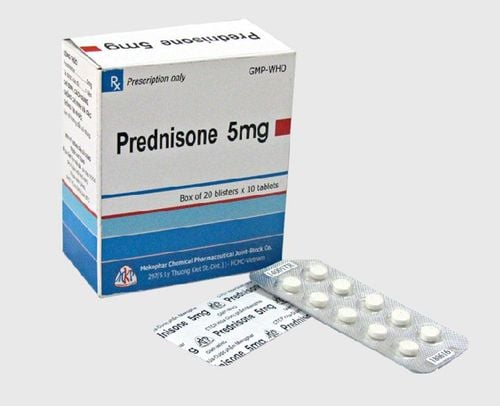This is an automatically translated article.
Sunigam is a non-steroidal anti-inflammatory and antipyretic analgesic, indicated in the treatment of symptoms in a number of conditions such as chronic rheumatoid arthritis, osteoarthritis, low back pain, various types of trauma or pain in otitis media,... So what is the use of Sunigam?1. What is the effect of Sunigam?
Sunigam medicine contains tiaprofenic acid as an active ingredient in the group of pain relievers, antipyretics, non-steroidal anti-inflammatory drugs, drugs for the treatment of gout and osteoarthritis. Therefore, Sunigam drug has no effect in the long-term treatment of symptoms and short-term acute pain episodes in a number of diseases such as:
Chronic rheumatoid arthritis, especially in rheumatoid arthritis Degenerative diseases painful joints and inability to work Low back pain Severe nerve root pain Trauma during contusions, fractures, sprains or after surgery Treatment of pain in cases of otitis media and oral cavity. However, in this case the benefits and risks need to be weighed, especially the risk of spreading the associated infection. Besides the above uses, Sunigam medicine may also be used to treat a number of other conditions that are not listed above. Therefore, before using the drug, consult your doctor for advice and effective use of the drug.
2. How to use Sunigam
Sunigam medicine is prepared in the form of tablets, taken with meals. Take the medicine with a full glass of water to avoid stomach irritation. The dose of the drug will depend on the disease condition and the age of the patient, usually the maximum duration of treatment is 5-10 days.
For adults using a loading dose of 2 tablets, taking 3 times a day and the maintenance dose calculated from the fourth day, taking 3-4 tablets/day. For children over 3 years old: oral dose of 10mg/kg/day divided into 3-4 times. Use Sunigam exactly as directed by your doctor, do not use too much, smaller or longer than prescribed. Absolutely do not arbitrarily increase the dose of the drug or abuse the drug for too long for a long time. This not only makes the condition better, but also increases the risk of unwanted effects.
3. Undesirable effects when using the drug Sunigam
Some unwanted effects that may occur when using Sunigam include:
Gastrointestinal disorders such as nausea, vomiting, diarrhea, epigastric pain at the beginning of treatment, ulceration, bleeding and perforation gastrointestinal tract after prolonged treatment. Skin: rash, pruritus, urticaria, purpura. Rare cases of erythema multiforme and bullous in Lyell syndrome and stevens johnson syndrome. Asthma exacerbations in patients already allergic to aspirin and other nonsteroidal anti-inflammatory drugs. General discomfort with hypotension, quincke edema, anaphylaxis Renal failure but reversible Urinary disorders such as dysuria, hematuria, urinary frequency, bladder pain. Central nervous system disorders Blood disorders such as purpura, thrombocytopenia. Before prescribing a drug, doctors always weigh the benefits and effectiveness of Sunigam pills more than the risk of side effects. However, some cases when using Sunigam can still occur unwanted effects. Therefore, when unusual symptoms occur, especially when a severe allergic reaction occurs with accompanying signs such as difficulty breathing, severe dizziness, rash, swelling or itching of the face, throat, tongue,... In this case, the patient should immediately notify the medical staff for immediate intervention.
4. Some notes when using Sunigam
Some notes when using Sunigam medicine include:
Inform your doctor about a history of allergy to Sunigam or any other allergies. Sunigam may contain ingredients that don't work and cause an allergic reaction or other serious problems. Report any medications you are taking including prescription and nonprescription drugs, herbs and supplements, foods, dyes or preservatives. Sunigam is contraindicated in patients with a history of asthma, whether or not caused by aspirin or non-steroidal anti-inflammatory drugs. Active peptic ulcer or a history of peptic ulcer, severe liver or kidney failure, pregnant women and children under 3 years of age. Use caution in the use of nonsteroidal anti-inflammatory drugs in infections or at risk of infection, even if well controlled, because the drug has the ability to reduce the body's natural resistance to infection, masking the signs of infection. common sign of infection. Monitor gastrointestinal symptoms and discontinue treatment if patient develops signs of gastrointestinal bleeding. Regular monitoring of liver and kidney function is required for long-term treatment. When initiating therapy, careful monitoring of diuresis and renal function is required in patients with heart failure, renal failure and chronic liver failure, in patients taking diuretics, and especially in adults. age. Stop treatment if blistering occurs. Urinary symptoms and cystitis have been reported with Sunigam and other nonsteroidal anti-inflammatory drugs. If any urinary symptoms appear, treatment with Sunigam should be stopped immediately. Limit the use of Sunigam to women who are breastfeeding. Take the missed dose as soon as possible. However, if the time you remember is close to the time of your next dose, skip the missed dose and continue taking the medicine as scheduled. Do not arbitrarily add more than double the dose of the drug than the treatment regimen. Using an overdose of Sunigam can cause serious symptoms such as nausea, vomiting, abdominal pain, weakness,...
5. Drug interactions
Drug interactions can reduce the effect of Sunigam, or increase the effect of unwanted effects. Tell your doctor about all other medicines you are taking including vitamins, over-the-counter medicines, prescription drugs, and herbal products. Do not stop, start, or change the dose of any medicine without your doctor's consent without your doctor's consent.
Some drugs that interact with Sunigam can include:
Oral anticoagulants due to an increased risk of bleeding Methotrexate due to increased blood toxicity, especially if used in high doses. Other non-steroidal anti-inflammatory drugs, including salicylate at high doses, are associated with an increased risk of gastrointestinal ulceration and bleeding. Systemic heparin: increases the risk of bleeding Diuretics: it is necessary for the patient to drink plenty of fluids and monitor liver and kidney function during the initial treatment because there is a risk of acute renal failure in dehydrated patients or decreased blood volume. ACE inhibitors reduce blood pressure lowering effect Beta blocker Ciclosporine Thrombolytics IUDs
6. How to store Sunigam
Store Sunigam at room temperature, away from light and away from moisture. Do not store Sunigam in a humid place or in the freezer. Different medicines will have different storage methods, so read the storage instructions on the package carefully, or ask your pharmacist. When the medicine has been damaged and cannot be used anymore or has expired, dispose of the medicine according to the correct procedure. Do not arbitrarily dispose of Sunigam into the environment such as water pipes or toilets unless requested.
In summary, Sunigam is a non-steroidal anti-inflammatory, antipyretic analgesic, indicated in the treatment of symptoms in a number of diseases such as chronic rheumatoid arthritis, osteoarthritis, low back pain, all kinds of injuries or pain in otitis media,... However, Sunigam can cause some unwanted effects and drug interactions, so tell your doctor what medicines you are taking to reduce the risk. risk of side effects and at the same time increase the effectiveness of the treatment process.
Please dial HOTLINE for more information or register for an appointment HERE. Download MyVinmec app to make appointments faster and to manage your bookings easily.













